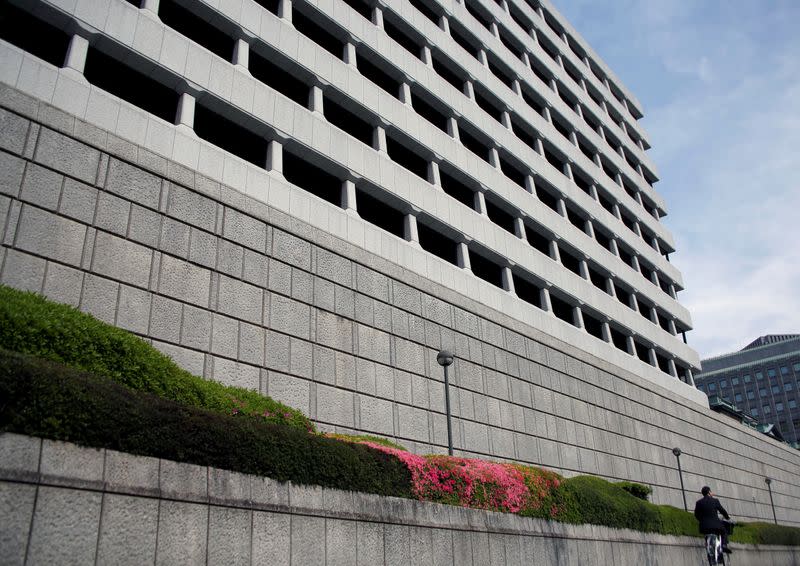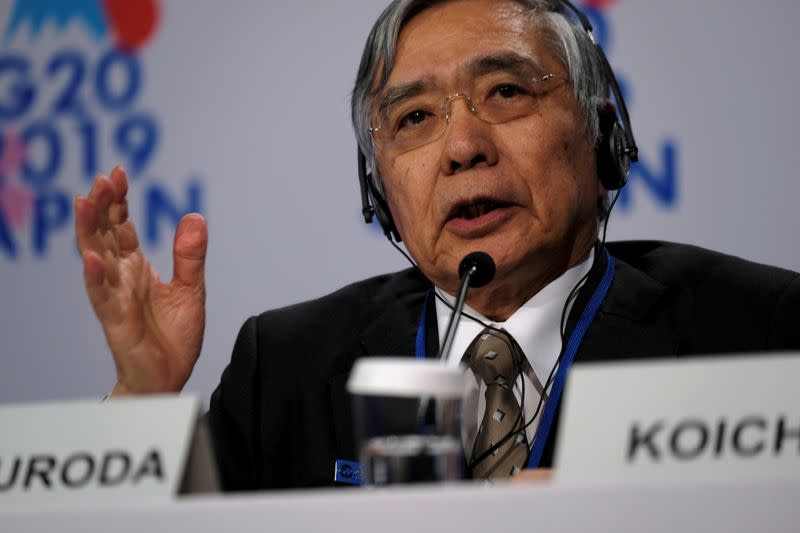Japan central bank loses billions on ETFs, may face annual loss
By Hideyuki Sano and Kaori Kaneko
TOKYO (Reuters) - The Bank of Japan on Tuesday acknowledged unrealised losses of 2-3 trillion yen (15-23 billion pounds) on its holdings of exchange-traded funds (ETFs) after a rout in Japanese stock prices, raising the prospect it could post an annual loss this year.
Analysts said a loss - highly unusual for a central bank - would be the first by the BOJ in nearly 40 years and could constrain the bank's attempts to prop up market sentiment with continued aggressive stock purchases.
The financial health of the BOJ, whose fiscal year ends next Tuesday, is increasingly tied to Japanese stock prices after the central bank, which already holds almost 30 trillion yen ($272 billion) of ETFs, doubled down on purchases this month.
If the share market falls further, a hardly unrealistic scenario given the impact of COVID-19 pandemic, the central bank could run out of all its reserves and even become insolvent on paper, some analysts say.
"The BOJ bought stocks at very high prices and will now need cover the losses ... it is scary," said Sayuri Kawamura, economist at Japan Research.
Japan's benchmark Nikkei share index <.N225> closed at 18,092 on Tuesday, still way below the average cost of entry for the BOJ at around 19,500.
The average costs have risen substantially in recent years as the BOJ has kept buying even as Japanese share prices have hit multi-year highs.
Its stock purchase started at a pace of one trillion yen per year in 2013 when the Nikkei was around 12,000. The buying expanded to 3 trillion yen in 2014 and to 6 trillion yen in 2016, ostensibly to boost economic growth and lift inflation, but many investors view the policy as direct intervention to prop up share prices.
The unrealised loss of 2-3 trillion yen would wipe out about 1.7 trillion yen of recurring profits the BOJ is estimated to make this year from interest payments on its massive bond holdings, said Hiroshi Ugai, senior economist at J.P. Morgan.
The BOJ is most likely to tap two other reserves totalling about 6 trillion yen, one for bonds and the other for currencies, to tide over the losses, analyst say.
Ugai estimates those reserves are enough to cover falls in the Nikkei to 14,393, about 20 percent below the current level.
Yuuki Fukumoto, strategist at NLI Research, said it made sense for the BOJ to buy stocks at present to reduce the risk premium in markets.
"But if there is a lesson to be learned, it is that it was pretty meaningless for the BOJ to buy stocks when the economy was doing okay," he said.
An earning loss at a central bank is rare given they lend or buy assets at almost no cost by printing money.
While the BOJ's mandate is to support the economy, fears of potential losses could limit the BOJ's ability to expand its stock purchases.
Some analysts say this may have already hobbled the BOJ when it announced earlier this month it would raise its stock buying target to a maximum of 12 trillion yen a year "for the moment."
The proclamation of aggressive buying had a footnote that the BOJ would buy ETFs at a pace of 6 trillion yen a year "in principle" but that it would increase or decrease the amount depending on market conditions.
Market players said the footnote quickly led to disappointment in the stock market, limiting the impact of the move.
"The fact that the BOJ put that footnote reflects concerns among some BOJ officials about the losses," said Nobuyasu Atago, chief economist at Okasan Securities.
(Reporting by Hideyuki Sano, Kaori Kaneko and Leika Kihara; Editing by Chris Gallagher and Richard Pullin)

 Yahoo Finance
Yahoo Finance 

